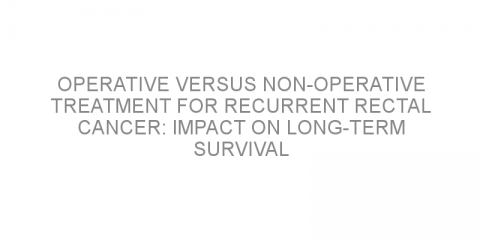In a nutshell The authors aimed to evaluate the association between age and survival outlook after surgery in colorectal cancer. Some background Generally, colorectal cancer is thought to affect mostly older people, with more than 90% of patients being diagnosed after age 55 years. However, despite there being a steady decline of colorectal cancer...
Read MoreTreatment(s) already received-Surgery Posts on Medivizor
Can lymphocyte to monocyte ratio predict outcome following surgery for stage III colon cancer?
In a nutshell This study evaluated the association between preoperative lymphocyte to monocyte ratio and time to recurrence and overall survival in colon cancer. Some background Surgery is the principle treatment option for advanced non-metastatic (has not spread to distant organs) colon cancer. 5-fluorouracil-based chemotherapy is the...
Read MoreCan the addition of oxiplatin to hyperthermic intraperitoneal chemotherapy improve the risk of colorectal peritoneal metastasis?
In a nutshell This study examined the appropriate dosage of oxaliplatin for use in hyperthermic intraperitoneal chemotherapy in colorectal cancer patients at risk for peritoneal metastasis. Some background Colorectal cancer that has spread to the peritoneum, the lining of the abdomen, generally has a poor prognosis, due to...
Read MoreEarly surveillance after surgery
In a nutshell This study evaluated the value of early surveillance using computed tomography (CT) after surgery to remove stage II or III colorectal cancer. Some background Treatment of colorectal cancer involves resection surgery, in which the tumor is removed along with neighboring parts of the colon or rectum. However, over half of the patients...
Read MoreWhat features of colorectal cancer can predict return of the cancer?
In a nutshell This study evaluated the characteristics of colorectal cancer recurrence (return of the cancer) within 5 years and after 5 years of follow-up after initial curative surgery. Some background In patients with colorectal cancer (CRC), removal of all cancer cells and a small amount of healthy tissue around the cancer when it appears to...
Read MoreEvaluating the safety and efficacy of adding oxliplatin to fluoropyrimidine chemoradiotherapy before surgery in patients with locally advanced rectal cancer
In a nutshell This review compared the efficacy and risks associated with adding oxaliplatin (OX) to fluoropyimidine (FU) chemoradiotherapy (CRT) before surgery in patients with locally advanced rectal cancer (LARC). Some background In LARC, the cancer has grown from the rectum (the lowest part of the large bowel) into surrounding...
Read MoreComparing the outcomes of laparoscopic versus open surgery in patients with colorectal cancer
In a nutshell This study compared the short- and long-term outcomes of two types of surgery for patients with colorectal cancer (CRC): open surgery (OS) versus laparoscopic surgery (LS). LS led to less pain following surgery, shorter hospital stays, faster recovery times, and improved survival rates. Some background CRC is very common,...
Read MoreRadiofrequency ablation as a treatment for pulmonary metastases after surgical treatment for liver metastases from colorectal cancer
In a nutshell This study looked at the use of radiofrequency ablation (RFA) as a treatment for colorectal cancer which has spread to the lungs (pulmonary metastasis). Overall, the results showed that RFA treatment gives patients a better survival rate than the previous method of systemic chemotherapy which used to be the best treatment option for...
Read MoreDefining patients with a high risk of developing peritoneal carcinomatosis after curative surgery
In a nutshell The objective of this study was to identify risk factors predictive for developing peritoneal carcinomatosis (PC) after curative surgery for colorectal cancer (CRC). The data show three situations that could result in a real risk of recurrent PC: synchronous PC, synchronous isolated ovarian metastases and a perforated primary tumor. There...
Read MorePhase II clinical trial evaluating the combination of cetuximab and erlotinib for the treatment of patients with metastatic colorectal cancer
In a nutshell This article presents the results of a phase II clinical trial that evaluated the efficacy and safety of the combination of two targeted therapies – cetuximab and erlotinib – for patients with metastatic colorectal cancer (mCRC). Some background Colorectal cancer that has spread outside the large...
Read MoreSurgery versus endoscopic resection for malignant colorectal polyps
In a nutshell The present study compared outcomes of two treatment methods for patients with malignant colorectal polyps (MCP): endoscopic versus surgical management. Some background Most colorectal cancers develop from a malignant (cancerous) polyp, an abnormal growth on the inner surface of the large intestine. When a polyp is found, the only...
Read MoreOperative versus non-operative treatment for recurrent rectal cancer: impact on long-term survival
In a nutshell The present paper compares long-term survival rates of surgery versus non-operative treatments in patients with recurrent rectal cancer (RRC). Some background Rectal cancer is cancer in the final section of the large intestine, or rectum. Surgery to remove the cancer is the first choice of treatment, but chemotherapy with or...
Read More











